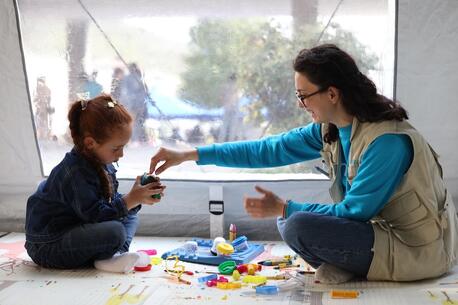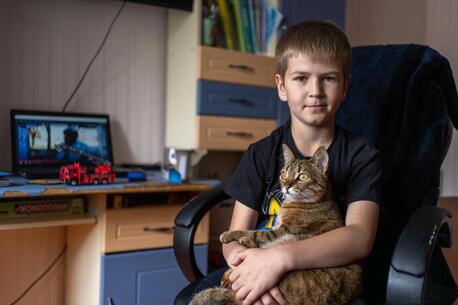
The Difference A Teacher Can Make
This Teacher Appreciation Week, we're celebrating all educators who go above and beyond for their students. UNICEF USA Community Engagement Intern Kyle King reflects on the impact one of his high school teachers had on his mental health.
Many people have special chairs in their lives — chairs that define a part of their day, mark a special occasion or bring up good memories. For some, the most special chair in their lives might be their spot at the dinner table, the chair they have sat in every night for as long as they can remember. For others, it may be the seat in the back right corner of geometry class where their crush passed them that note saying she thought they were cute too, or the Horah chair they kept from their Bat Mitzvah, or maybe it's just a comfy recliner in their living room. For my part, the most special chair is an old and somewhat tattered red chair positioned next to a wobbly plastic-made-to-look-like-wood desk in the back of a US History classroom in South Florida.
The chair might not seem all that great to anyone other than myself. To me, though, it is a symbol of comfort, somewhere I feel at home. But my fond feelings for that creaking and lopsided seat have nothing to do with the chair itself (I'll admit, it's not that comfortable) but rather because of the woman who sat across from me: Ms. Salmeri, my US History teacher.
I was anxious and sleep-deprived but managed to put on a mask most days to show up as if nothing was wrong.
11th grade was a tough year for me. My class schedule felt overwhelming and left me little time to breathe. I was losing sleep over the prospect of college, my face was riddled with acne, I wasn’t sure if I had any true friends — the kind that care more about you than about getting invited to the next party. I was anxious and sleep-deprived but managed to put on a mask most days to show up as if nothing was wrong. I wanted to talk to someone but didn’t know who to turn to. I didn’t know if any of my friends would care, and speaking with my parents just felt weird.
Eventually, the pressure built until it was clearly affecting my ability to work well in school. So, after US History one day, I approached Ms. Salmeri’s desk and, struggling to get the words out, told her that I might have to drop her class. From behind her large oak desk, she looked up from the papers she was grading and asked, “Why?”
“I’m just in over my head with my classes right now. I thought I could handle a tougher schedule than I actually could.”
“You’re a smart kid, Kyle,” she replied, “Is there something else to this you want to talk about?”
And although I couldn't have explained why, I felt better at the end of my monologue — getting my thoughts out and having someone else just nod their head sympathetically made things feel a little more ok.
“Well, actually, yes,” I responded. She gestured towards the disheveled red chair on the side of her desk and I sat down, the chair creaking with exhaustion as I did so. Then, for the first time, I told her everything in my head. I told her all my fears and my insecurities and my worries. I told her everything that had been weighing me down. And, for about an hour, she listened, occasionally interjecting with words of wisdom or comfort. And although I couldn’t have explained why, I felt better at the end of my monologue — getting my thoughts out and having someone else just nod their head sympathetically made things feel a little more ok.
Ms. Salmeri told me that there was a lot more to my situation right now than a busy schedule and that I should give myself a little more time before switching anything. She then said, gesturing to the red seat, that she was here to listen whenever I needed it.
High scohol began to feel less like a series of assignments that I needed to complete and more like an opportunity to enrich myself truly.
I took her up on the offer and throughout the rest of that year, I would occasionally barge into Ms. Salmeri’s classroom (in between classes, of course), sit down in that red chair, and share with her. Her room and that chair began to feel like a home away from home. I began to feel comfortable in her room, and feeling comfortable somewhere made me a little more comfortable everywhere. Not to mention, spending so much time in the room of a US history teacher, I began to fall in love with US history. Our bond made me excited to learn, first history and then everything. Through our relationship, high school began to feel less like a series of assignments that I needed to complete and more like an opportunity to enrich myself truly.
Now I'm a sophomore in college, and I still think about Ms. Salmeri, that classroom and that red chair. I think of how important our relationship was in helping me navigate high school and make it to college, and I am perpetually grateful for the time and energy she spent on me. I have not had the chance to visit Ms. Salmeri yet, but when I do, I know exactly where to go: straight back, past the rows of desks to my left and whiteboard to my right, straight to the most meaningful chair in my life.
This Mental Health Awareness Month and Teacher Appreciation Week, make your teacher's day (or week!) and have all your club members and other students write a thank-you note to a teacher that really cares about their students' well-being! Deliver these thank-you notest to the teachers sometime this week and let them know that their efforts are noticed and appreciated.

HOW TO HELP
There are many ways to make a difference
War, famine, poverty, natural disasters — threats to the world's children keep coming. But UNICEF won't stop working to keep children healthy and safe.
UNICEF works in over 190 countries and territories — more places than any other children's organization. UNICEF has the world's largest humanitarian warehouse and, when disaster strikes, can get supplies almost anywhere within 72 hours. Constantly innovating, always advocating for a better world for children, UNICEF works to ensure that every child can grow up healthy, educated, protected and respected.
Would you like to help give all children the opportunity to reach their full potential? There are many ways to get involved.





